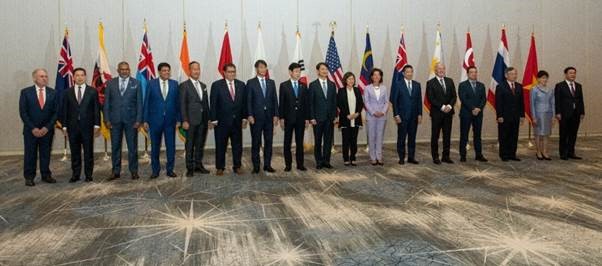
Disclaimer: Copyright infringement not intended.
Context: An Inter-Ministerial delegation from India led by Department of Commerce participated in the second Indo-Pacific Economic Framework for Prosperity (IPEF) negotiating round in Bali, Indonesia.
Details:
Highlights of the meet:
- During the Bali Round, discussions covered all the four pillars of the IPEF: Trade (Pillar I); Supply Chains (Pillar II); Clean Economy (Pillar III); and Fair Economy (Taxation & Anticorruption) - (Pillar IV).
- India participated in the discussions related to Pillars II to IV.
- IPEF Partners undertook in-depth text-based discussions and conducted follow-up conversations as they work to advance a shared vision for an open, connected, prosperous and resilient Indo-Pacific region.
.jpeg)
Earlier rounds:
- First IPEF Round held in Brisbane, Australia, in December 10-15, 2022
- Special negotiating round held in New Delhi, India from February 8-11, 2023,
About Indo-Pacific Economic Framework for Prosperity (IPEF):
Background:
- In May 2022, the United States launched the Indo-Pacific Economic Framework for Prosperity (IPEF) with Australia, Brunei Darussalam, Fiji India, Indonesia, Japan, the Republic of Korea, Malaysia, New Zealand, Philippines, Singapore, Thailand, and Vietnam.
- The 14 IPEF partners represent 40 percent of global GDP and 28 percent of global goods and services trade.
Aim and objectives:
- This framework will advance resilience, sustainability, inclusiveness, economic growth, fairness, and competitiveness for the economies.
- Through this initiative, the IPEF partners aim to contribute to cooperation, stability, prosperity, development, and peace within the region.
- This framework will offer tangible benefits that fuel economic activity and investment, promote sustainable and inclusive economic growth, and benefit workers and consumers across the region.

4 key pillars:
- The launch began discussions of future negotiations on the following pillars:
(1) Trade;
(2) Supply Chains;
(3) Clean Energy, Decarbonization, and Infrastructure; and
(4) Tax and Anti-Corruption.
- The IPEF is designed to be flexible, meaning that IPEF partners are not required to join all four pillars.
Connected Economy:
- Pursue high-standard rules of the road in the digital economy, including standards on cross-border data flows and data localization.
- Seize opportunities and address concerns in the digital economy, in order to ensure small and medium sized enterprises can benefit from the region’s rapidly growing e-commerce sector, while addressing issues is such as online privacy and discriminatory and unethical use of Artificial Intelligence.
- Seek strong labor and environment standards and corporate accountability provisions that promote a race to the top for workers through trade.
Resilient Economy: Seek first-of-their-kind supply chain commitments that better anticipate and prevent disruptions in supply chains to create a more resilient economy and guard against price spikes
Clean Economy: Seek first-of-their-kind commitments on clean energy, decarbonization, and infrastructure that promote good-paying jobs.
Fair Economy: Seek commitments to enact and enforce effective tax, anti-money laundering, and anti-bribery regimes that are in line with our existing multilateral obligations to promote a fair economy.
|
PRACTICE QUESTION
Q) IPEF will advance resilience, sustainability, inclusiveness, economic growth, fairness, and competitiveness for the economies. Analyse this statement from the Indian context. (250 words)
|

https://www.pib.gov.in/PressReleasePage.aspx?PRID=1909680




